Organic Chemistry
Isoquinoline is a heterocyclic compound containing a benzene ring and a pyridine ring. It’s the isomer of quinoline and the product of naphthalene after its CH group on β position is substituted by N atoms. It is colorless to pale yellow liquid or flaky crystal and have a pungent odor similar to anise oil and benzaldehyde along with its hydroscopicity and relatively stronger alkaline than quinoline. Isoquinoline is pretty active so that it can participate in nucleophilic and electrophilic reactions as well as oxidation and reduction. The basic structures of many alkaloids such as berberine, papaverine and morphine contain isoquinoline and hydrogenated isoquinoline.
Applications: isoquinoline can be used as a solvent of polyimide film; also as raw materials of organic conductor, dyes, photopigment, insecticides, alkaloids, pharmaceutical and fungicides and rubber vulcanization accelerator. It is used in the preparation of pyridine carboxylic acid after its oxidation and isoquinoline derivatives; isoquinoline hydrochloride is a chemical reagent for the determination of zinc, cadmium, cobalt, copper, etc.
Preparation:
(1) in the Bischler method proposed in 1893, 3,4-dihydroisoquinoline is generated in the dehydration and condensated ringclosing of β- phenylethylamine under the effect of phosphorus pentoxide (or ZnCl2, POCl3, etc.) as a dehydrating agent; then it’s dehydrogenized to produce isoquinoline in the catalysis of palladium at 190℃.
(2) rearrangement of cinnamaldehyde oxime: isoquinoline can be obtained in the Beckmann rearrangement of cinnamaldehyde oxime under the effect of the phosphorus pentoxide (or sulfuric acid, polyphosphoric acid), followed by dehydration ringclosing.
- Structure:

- Chemical Name:1,2,3,4-TETRAHYDROISOQUINOLINE
- CAS:91-21-4
- MF:C9H11N
- Structure:

- Chemical Name:7-Bromoisoquinoline
- CAS:58794-09-5
- MF:C9H6BrN
- Structure:

- Chemical Name:6,7-Dimethoxy-1,2,3,4-tetrahydroisoquinoline hydrochloride
- CAS:2328-12-3
- MF:C11H16ClNO2
- Structure:
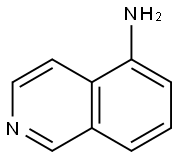
- Chemical Name:5-Aminoisoquinoline
- CAS:1125-60-6
- MF:C9H8N2
- Structure:
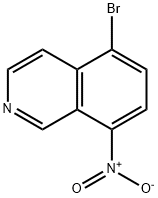
- Chemical Name:5-Bromo-8-nitroisoquinoline
- CAS:63927-23-1
- MF:C9H5BrN2O2
- Structure:
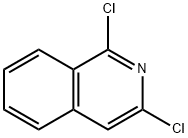
- Chemical Name:1,3-Dichloroisoquinoline
- CAS:7742-73-6
- MF:C9H5Cl2N
- Structure:

- Chemical Name:Isoquinolin-3-amine
- CAS:25475-67-6
- MF:C9H8N2
- Structure:
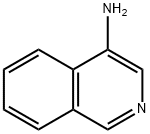
- Chemical Name:4-Aminoisoquinoline
- CAS:23687-25-4
- MF:C9H8N2
- Structure:

- Chemical Name:6,7-Dimethoxy-3,4-dihydroisoquinoline hydrochloride
- CAS:20232-39-7
- MF:C11H14ClNO2
- Structure:

- Chemical Name:3-BROMOISOQUINOLINE
- CAS:34784-02-6
- MF:C9H6BrN
- Structure:
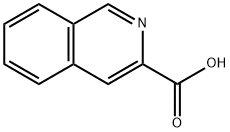
- Chemical Name:Isoquinoline-3-carboxylic acid
- CAS:6624-49-3
- MF:C10H7NO2
- Structure:
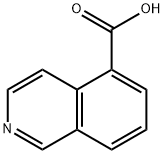
- Chemical Name:ISOQUINOLINE-5-CARBOXYLIC ACID
- CAS:27810-64-6
- MF:C10H7NO2
- Structure:
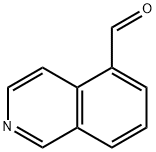
- Chemical Name:ISOQUINOLINE-5-CARBALDEHYDE
- CAS:80278-67-7
- MF:C10H7NO
- Structure:

- Chemical Name:ISOQUINOLINE-3-CARBOXYLIC ACID
- CAS:203626-75-9
- MF:C10H7NO2
- Structure:

- Chemical Name:6-AMINOISOQUINOLINE
- CAS:23687-26-5
- MF:C9H8N2
- Structure:

- Chemical Name:6-bromo-1,2,3,4-tetrahydroisoquinoline
- CAS:226942-29-6
- MF:C9H10BrN
- Structure:
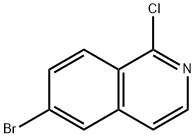
- Chemical Name:6-Bromo-1-chloroisoquinoline
- CAS:205055-63-6
- MF:C9H5BrClN
- Structure:
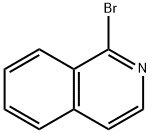
- Chemical Name:1-Bromoisoquinoline
- CAS:1532-71-4
- MF:C9H6BrN
- Structure:
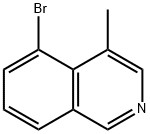
- Chemical Name:5-Bromo-4-methylisoquinoline
- CAS:651310-24-6
- MF:C10H8BrN
- Structure:
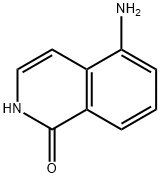
- Chemical Name:5-AMINO-2H-ISOQUINOLIN-1-ONE
- CAS:93117-08-9
- MF:C9H8N2O
- Structure:

- Chemical Name:6,7-Dimethoxy-3,4-dihydroisoquinoline
- CAS:3382-18-1
- MF:C11H13NO2
- Structure:
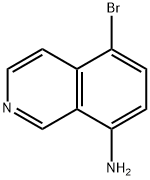
- Chemical Name:5-BROMO-8-ISOQUINOLINEAMINE
- CAS:90721-35-0
- MF:C9H7BrN2
- Structure:

- Chemical Name:5,6,7,8-TETRAHYDROISOQUINOLINE
- CAS:36556-06-6
- MF:C9H11N
- Structure:

- Chemical Name:Isoquinoline, 6-chloro- (6CI,9CI)
- CAS:62882-02-4
- MF:C9H6ClN
- Structure:
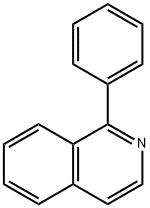
- Chemical Name:Phenylisoquinoline
- CAS:3297-72-1
- MF:C15H11N
- Structure:
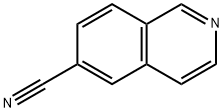
- Chemical Name:6-Isoquinolinecarbonitrile(9CI)
- CAS:106778-42-1
- MF:C10H6N2
- Structure:
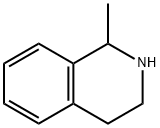
- Chemical Name:1-methyl-1,2,3,4-tetrahydroisoquinoline
- CAS:4965-09-7
- MF:C10H13N
- Structure:

- Chemical Name:3-isoquinolinecarboxaldehyde
- CAS:5470-80-4
- MF:C10H7NO
- Structure:
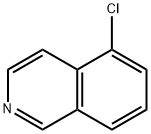
- Chemical Name:5-CHLOROISOQUINOLINE
- CAS:5430-45-5
- MF:C9H6ClN
- Structure:
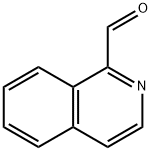
- Chemical Name:ISOQUINOLINE-1-CARBALDEHYDE
- CAS:4494-18-2
- MF:C10H7NO
- Structure:

- Chemical Name:7-Hydroxy-6-methoxy-3,4-dihydroisoquinoline
- CAS:4602-73-7
- MF:C10H11NO2
- Structure:
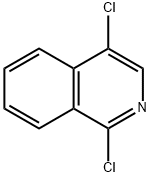
- Chemical Name:1,4-DICHLOROISOQUINOLINE
- CAS:15298-58-5
- MF:C9H5Cl2N
- Structure:

- Chemical Name:ISOQUINOLINE-3-CARBOXYLIC ACID HYDRATE
- CAS:207399-25-5
- MF:C10H9NO3
- Structure:

- Chemical Name:6-Methoxy-1,2,3,4-tetrahydroisoquinoline hydrochloride
- CAS:57196-62-0
- MF:C10H14ClNO
- Structure:
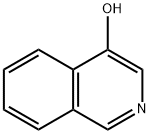
- Chemical Name:Isoquinolin-4-ol
- CAS:3336-49-0
- MF:C9H7NO
- Structure:

- Chemical Name:7-Aminoisoquinoline
- CAS:23707-37-1
- MF:C9H8N2
- Structure:
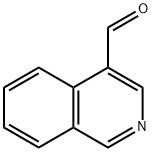
- Chemical Name:Isoquinoline-4-carbaldehyde
- CAS:22960-16-3
- MF:C10H7NO
- Structure:
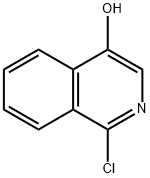
- Chemical Name:1-CHLORO-4-HYDROXYISOQUINOLINE
- CAS:3336-43-4
- MF:C9H6ClNO
- Structure:
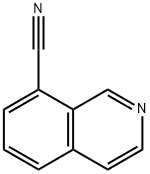
- Chemical Name:8-Isoquinolinecarbonitrile(9CI)
- CAS:362606-11-9
- MF:C10H6N2
- Structure:

- Chemical Name:6-bromoisoquinolin-3-amine
- CAS:891785-28-7
- MF:C9H7BrN2
- Structure:
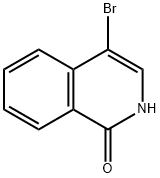
- Chemical Name:4-BROMO-1(2H)-ISOQUINOLONE
- CAS:3951-95-9
- MF:C9H6BrNO
- Structure:

- Chemical Name:6-BROMO-3-CHLOROISOQUINOLINE
- CAS:552331-06-3
- MF:C9H5BrClN
- Structure:
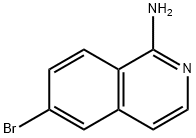
- Chemical Name:6-BROMOISOQUINOLIN-1-YLAMINE
- CAS:215453-26-2
- MF:C9H7BrN2
- Structure:
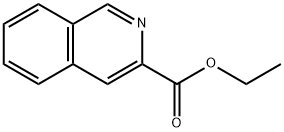
- Chemical Name:ETHYL ISOQUINOLINE-3-CARBOXYLATE
- CAS:50458-79-2
- MF:C12H11NO2
- Structure:
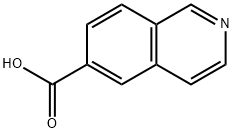
- Chemical Name:6-isoquinolinecarboxylic acid
- CAS:106778-43-2
- MF:C10H7NO2
- Structure:
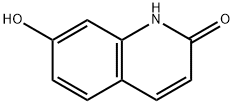
- Chemical Name:7-Hydroxyquinolinone
- CAS:70500-72-0
- MF:C9H7NO2
- Structure:

- Chemical Name:Decahydroisoquinoline
- CAS:6329-61-9
- MF:C9H17N
- Structure:

- Chemical Name:3-Methylisoquinoline
- CAS:1125-80-0
- MF:C10H9N
- Structure:
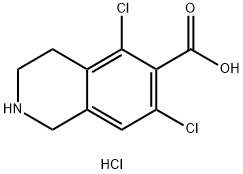
- Chemical Name:5,7-Dichloro-1,2,3,4-Tetrahydroisoquinoline-6-Carboxylic Acid Hydrochloride
- CAS:1289646-93-0
- MF:C10H10Cl3NO2
- Structure:
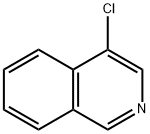
- Chemical Name:4-Chloroisoquinoline
- CAS:1532-91-8
- MF:C9H6ClN
- Structure:
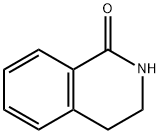
- Chemical Name:3,4-Dihydro-2H-isoquinolin-1-one
- CAS:1196-38-9
- MF:C9H9NO
- Structure:
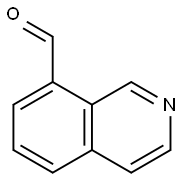
- Chemical Name:ISOQUINOLINE-8-CARBALDEHYDE
- CAS:787615-01-4
- MF:C10H7NO
- Structure:
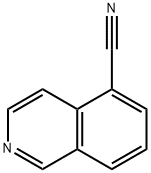
- Chemical Name:5-CYANOISOQUINOLINE
- CAS:27655-41-0
- MF:C10H6N2
- Structure:
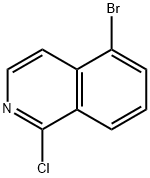
- Chemical Name:5-BROMO-1-CHLOROISOQUINOLINE
- CAS:34551-41-2
- MF:C9H5BrClN
- Structure:

- Chemical Name:6-Isoquinolinecarboxaldehyde (9CI)
- CAS:173089-81-1
- MF:C10H7NO
- Structure:
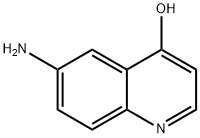
- Chemical Name:4-Quinolinol,6-amino-(9CI)
- CAS:56717-02-3
- MF:C9H8N2O
- Structure:
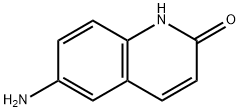
- Chemical Name:2(1H)-Quinolinone,6-amino-(9CI)
- CAS:79207-68-4
- MF:C9H8N2O
- Structure:
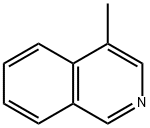
- Chemical Name:4-Methylisoquinoline
- CAS:1196-39-0
- MF:C10H9N
- Structure:
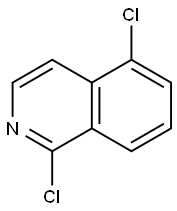
- Chemical Name:1,5-DICHLOROISOQUINOLINE
- CAS:70810-23-0
- MF:C9H5Cl2N
- Structure:

- Chemical Name:3-(Chloromethyl)isoquinoline
- CAS:147937-36-8
- MF:C10H8ClN
- Structure:
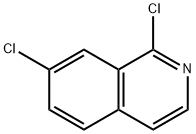
- Chemical Name:1,7-Dichloroisoquinoline
- CAS:70810-24-1
- MF:C9H5Cl2N
- Structure:
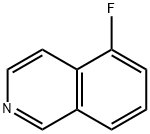
- Chemical Name:5-Fluoroisoquinoline
- CAS:394-66-1
- MF:C9H6FN
- Structure:
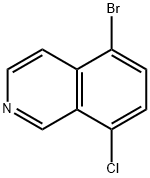
- Chemical Name:5-BROMO-8-CHLOROISOQUINOLINE
- CAS:956003-79-5
- MF:C9H5BrClN
- Structure:
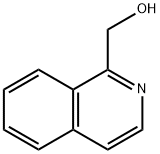
- Chemical Name:1-ISOQUINOLINEMETHANOL
- CAS:27311-63-3
- MF:C10H9NO
- Structure:
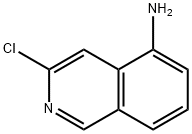
- Chemical Name:5-Isoquinolinamine,3-chloro-(9CI)
- CAS:58142-49-7
- MF:C9H7ClN2
- Structure:
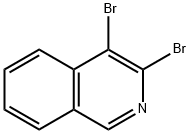
- Chemical Name:3,4-DIBROMOISOQUINOLINE
- CAS:36963-44-7
- MF:C9H5Br2N
- Structure:
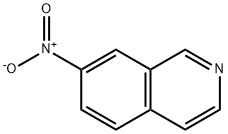
- Chemical Name:7-Nitroisoquinoline
- CAS:13058-73-6
- MF:C9H6N2O2
- Structure:

- Chemical Name:6-FLUOROISOQUINOLINE
- CAS:1075-11-2
- MF:C9H6FN
- Structure:
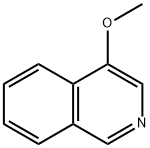
- Chemical Name:4-Methoxyisoquinoline
- CAS:36034-54-5
- MF:C10H9NO
- Structure:
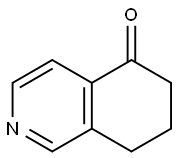
- Chemical Name:7,8-DIHYDROISOQUINOLIN-5(6H)-ONE
- CAS:21917-86-2
- MF:C9H9NO
- Structure:
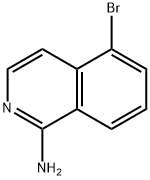
- Chemical Name:5-BROMOISOQUINOLIN-1-AMINE
- CAS:852570-80-0
- MF:C9H7BrN2
- Structure:

- Chemical Name:(Isoquinolin-7-yl)methanamine
- CAS:1053655-96-1
- MF:C10H10N2
- Structure:

- Chemical Name:2-ETHYL-1,2,3,4-TETRAHYDRO-ISOQUINOLINE-3-CARBOXYLIC ACID
- CAS:1022919-86-3
- MF:C12H15NO2
- Structure:
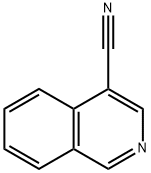
- Chemical Name:ISOQUINOLINE-4-CARBONITRILE
- CAS:34846-65-6
- MF:C10H6N2
- Structure:

- Chemical Name:7-CHLOROISOQUINOLINE
- CAS:34784-06-0
- MF:C9H6ClN
- Structure:
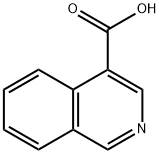
- Chemical Name:Isoquinoline-4-carboxylic acid
- CAS:7159-36-6
- MF:C10H7NO2
- Structure:
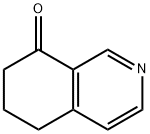
- Chemical Name:6,7-DIHYDRO-5H-ISOQUINOLIN-8-ONE
- CAS:21917-88-4
- MF:C9H9NO
- Structure:
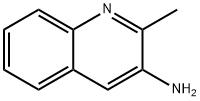
- Chemical Name:3-AMINO-2-METHYLQUINOLINE
- CAS:21352-22-7
- MF:C10H10N2
- Structure:

- Chemical Name:7-methylisoquinoline
- CAS:54004-38-5
- MF:C10H9N
- Structure:
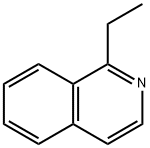
- Chemical Name:Isoquinoline, 1-ethyl-
- CAS:7661-60-1
- MF:C11H11N
- Structure:
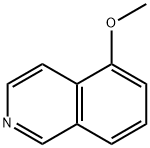
- Chemical Name:5-methoxyisoquinoline
- CAS:90806-58-9
- MF:C10H9NO
- Structure:
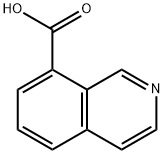
- Chemical Name:ISOQUINOLINE-8-CARBOXYLIC ACID
- CAS:61563-43-7
- MF:C10H7NO2
- Structure:

- Chemical Name:Isoquinolin-3-ylmethanamine
- CAS:132833-03-5
- MF:C10H10N2
- Structure:
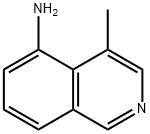
- Chemical Name:4-Methylisoquinolin-5-amine
- CAS:194032-18-3
- MF:C10H10N2
- Structure:

- Chemical Name:7-Isoquinolinecarboxaldehyde (6CI,9CI)
- CAS:87087-20-5
- MF:C10H7NO
- Structure:
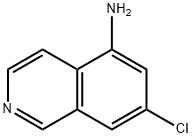
- Chemical Name:5-Isoquinolinamine,7-chloro-(9CI)
- CAS:608515-70-4
- MF:C9H7ClN2
- Structure:

- Chemical Name:isoquinolin-3-ylmethanol
- CAS:76884-34-9
- MF:C10H9NO
- Structure:
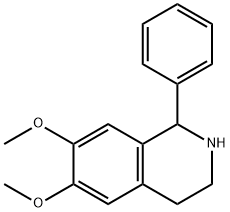
- Chemical Name:6,7-dimethoxy-1-phenyl-1,2,3,4-tetrahydroisoquinoline
- CAS:4118-36-9
- MF:C17H19NO2
- Structure:
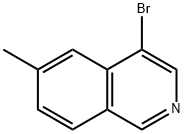
- Chemical Name:4-Bromo-6-methylisoquinoline
- CAS:1204298-52-1
- MF:C10H8BrN
- Structure:
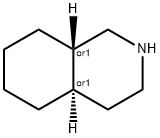
- Chemical Name:TRANS-DECAHYDROISOQUINOLINE
- CAS:2744-09-4
- MF:C9H17N
- Structure:

- Chemical Name:3,4-DIHYDROISOQUINOLINE
- CAS:3230-65-7
- MF:C9H9N
- Structure:
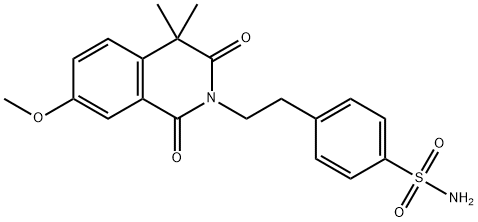
- Chemical Name:p-[2-(3,4-dihydro-7-methoxy-4,4-dimethyl-1,3-dioxo-2(1H)-isoquinolyl)ethyl]benzenesulphonamide
- CAS:33456-68-7
- MF:C20H22N2O5S
- Structure:
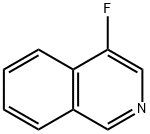
- Chemical Name:4-Fluoroisoquinoline
- CAS:394-67-2
- MF:C9H6FN
- Structure:
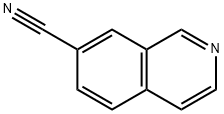
- Chemical Name:7-Isoquinolinecarbonitrile(9CI)
- CAS:223671-92-9
- MF:C10H6N2
- Structure:
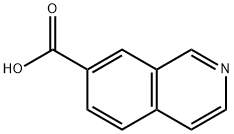
- Chemical Name:7-isoquinolinecarboxylic acid
- CAS:221050-96-0
- MF:C10H7NO2
- Structure:

- Chemical Name:(Isoquinolin-6-yl)methanamine
- CAS:1053655-94-9
- MF:C10H10N2
- Structure:
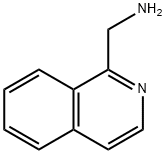
- Chemical Name:1-ISOQUINOLIN-1-YLMETHANAMINE DIHYDROCHLORIDE
- CAS:40615-08-5
- MF:C10H10N2
- Structure:
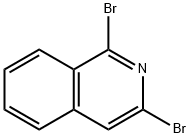
- Chemical Name:1,3-DIBROMOISOQUINOLINE
- CAS:53987-60-3
- MF:C9H5Br2N
- Structure:
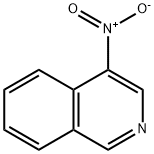
- Chemical Name:4-NITROISOQUINOLINE
- CAS:36073-93-5
- MF:C9H6N2O2
- Structure:
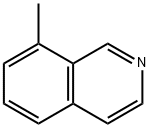
- Chemical Name:8-METHYL-ISOQUINOLINE
- CAS:62882-00-2
- MF:C10H9N